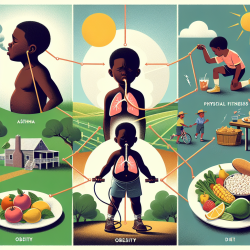Introduction
The Asenze Cohort Study, conducted in KwaZulu-Natal, South Africa, provides a comprehensive look at child development in a region heavily impacted by HIV/AIDS and socioeconomic disparities. This longitudinal study offers invaluable insights for speech-language pathologists and other practitioners working with children, particularly in low- and middle-income countries. By understanding the study's findings, practitioners can enhance their approaches to therapy and intervention, ultimately leading to better outcomes for children.
Key Findings and Their Implications
The Asenze study followed nearly 1,600 children and their primary caregivers over three waves, assessing various factors that influence child development. The study's findings highlight the significant impact of HIV exposure, socioeconomic status, and caregiver mental health on children's cognitive and social development. Here are some key takeaways and their implications for practitioners:
- HIV Impact: Children exposed to HIV, even if uninfected, showed different developmental outcomes compared to their unexposed peers. Practitioners should consider the potential cognitive and language delays in HIV-exposed children and tailor interventions accordingly.
- Socioeconomic Factors: The study found that children from lower socioeconomic backgrounds had poorer cognitive outcomes. This underscores the importance of considering environmental factors in assessment and intervention planning.
- Caregiver Mental Health: A significant number of caregivers in the study screened positive for mental health disorders, which correlated with adverse child outcomes. Practitioners should incorporate caregiver mental health support into their intervention plans to improve child outcomes.
Implementing Findings in Practice
For speech-language pathologists and other child development professionals, the Asenze study provides a data-driven foundation for refining intervention strategies. Here are some actionable steps practitioners can take:
- Holistic Assessment: Incorporate assessments that consider the child's health, environmental, and caregiver factors. This approach ensures a comprehensive understanding of the child's developmental context.
- Targeted Interventions: Develop interventions that address specific challenges identified in the study, such as cognitive delays in HIV-exposed children or behavioral issues linked to caregiver mental health.
- Collaboration with Caregivers: Engage caregivers in the therapeutic process, providing them with resources and support to address their mental health needs, which can positively influence child outcomes.
Encouraging Further Research
The Asenze Cohort Study is a model for how longitudinal research can inform practice and policy. Practitioners are encouraged to engage in or support further research that explores the intersections of health, environment, and development. Such research can lead to the development of community-informed interventions that are culturally and contextually relevant.
Conclusion
The Asenze Cohort Study offers critical insights that can transform how practitioners approach child development in challenging contexts. By integrating these findings into practice, professionals can contribute to improved outcomes for children not only in South Africa but in similar settings worldwide.
To read the original research paper, please follow this link: The Asenze Cohort Study in KwaZulu-Natal, South Africa: protocol and cohort profile.










